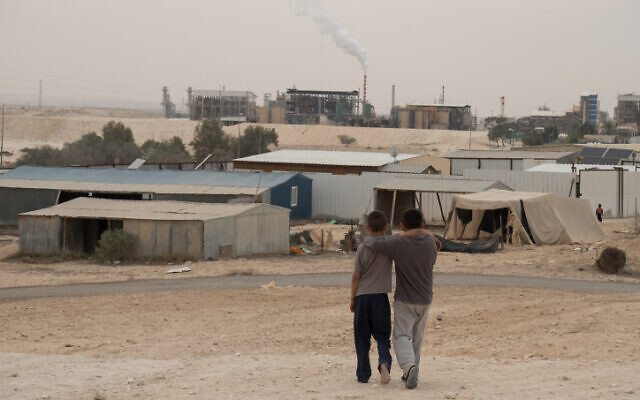Environment minister slams plan to weaken pollution regulations to help business
Tamar Zandberg says proposal in Economic Arrangements Bill would leave ministry with ‘responsibility but no authority,’ posing risk to public health, environment
Sue Surkes is The Times of Israel's environment reporter.

Environmental Protection Minister Tamar Zandberg warned on Wednesday that a proposal to create a business licensing committee in the Prime Minister’s Office would strip her office of the ability to impose environmental protections and protect the public.
The proposal appears in the draft of the Economic Arrangements Bill being advanced to accompany the next state budget and is aimed at reducing red tape for businesses.
Zandberg called a press conference on Wednesday, saying that there was a lack of progress in negotiations to either remove the plan from the Economic Arrangements Bill or amend it. Talks with Yamina party lawmaker Abir Kara, a deputy minister in the PMO, had revealed wide differences in ideology and world views, she said.
“We are very worried as a ministry, and I’m worried as a minister, about the lack of progress,” she said, charging that watering down licensing requirements to benefit business posed a “risk to public health, the public interest and the environment.”
The proposals, which have long been under development in the Prime Minister’s Office, seek, “the release of barriers and the acceleration of business activity,” according to the bill’s text.
“The need for the current reform arises due to the difficulty of businesses in the face of stringent and complex licensing requirements,” it says.

There are at least 150,000 licensed businesses in Israel, and every year another 10 % of new licensed businesses are opening, the text says. But due to overly stringent license conditions, 30% of businesses prefer to operate without one.
The proposed Business Licensing Committee, with one Environmental Protection Ministry representative, will be authorized to formulate new conditions and amend existing ones, taking into account implementation costs, the likelihood of risk and international standards.
According to Zandberg, not only will the creation of the new committee not cut red tape, but it will increase it, putting more pressure on regulators and already stretched resources, leading to longer licensing times.

Zandberg said that the conditions of business licenses were often the only tool available to the ministry to limit water and soil pollution caused by the likes of livestock farms, refuse dumps and gas stations, restrict emissions of global warming gases from rubbish dumps, and ensure that potentially carcinogenic materials from dry cleaners did not harm residents living nearby.

“We are supposed to protect the public against these dangers,” she stressed.
“The [new licensing] committee makeup is twisted in an extreme way to [favor] businesss interests,” ministry director general Galit Cohen warned. “It will give us nothing to have just one representative from the Environmental Protection Ministry.”

Referring to external experts taking the place of ministry professionals, she said, “Who will be able to answer these super complex issues dealt with by nearly 600 ministry staff members from multiple disciplines and a wide range of expertise? We have an expert in every field, know exactly what the regulations are in most developed nations of the world. Who will they find to do this? Even we don’t have one person who knows it all.”
Cohen said that as a result of Environment Ministry conditions, businesses had invested in environmental improvements.
Cohen said the effort to boost the economy could actually end up harming it.
“They talk about the economic difficulties of the companies. But what about the costs imposed on the public by pollution, the cost of rehabilitating polluted soil, which is hundreds of times more than the cost of preventing it?”
“What about exposure to radiation, to dangerous substances? We, the public, pay twice – we get sick and have to pay for public health services.”
Zandberg avoided saying whether she would oppose the state budget unless this plan was changed, insisting that after three years without a budget, it was critical to pass one and that there was still time to change the decree.









